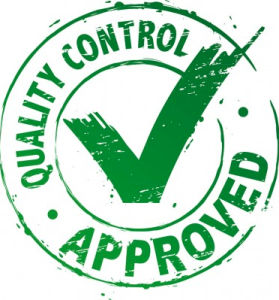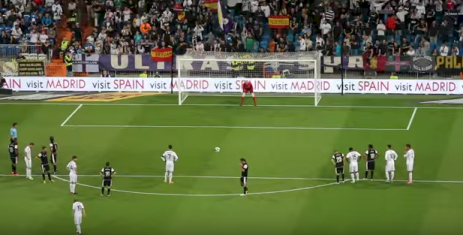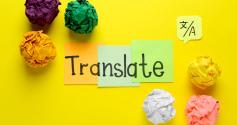Why does a translation need editing?

Índice de contenidos
Index of contents
Index du contenu
Inhaltsverzeichnis
Indice dei contenuti
Can I trust a translation that needs editing?
When I first started offering translation services, I remember how much mistrust it would generate in clients when I offered them the option of editing the translation. It's a common mistake among some businesses to assume that their clients know all about their product or service. Another mistake is giving them too much information when they're not interested and nor do they have the knowledge to understand. I made both these mistakes at the time: I remember the response I received from the Country Manager of a company based in Barcelona in Spain as if it were yesterday. When I asked him if he wanted the translation editing and gave him the ensuing explanation, he snapped back at me: "I just want a good translation, send me a quote and that's that".
My knowledge of sales is self-taught and that particular conversation was a master class. I still remember it years later and even today it is still a very much current issue. This blog explains some of the reasons why translation agencies offer editing services, why editing is required according to the EN-15038 quality standard for translation services and why large multinational companies adopt this process.
Quality assurance: what differentiates leading brands from the rest
Regardless of other elements such as the materials used or the processes followed, manufacturing any first-rate good or product should include quality assurance processes in order to detect possible errors during the production chain. The more frequent and thorough these quality assurance processes, the greater the chance of finding a batch of products with manufacturing defects.

The above, which applies to an industrial production line is equally true in the case of the translation industry. The editing process implies a qualified professional who can evaluate the quality of the translation and correct any potential human errors made by the translator.
To err is human
As I'm writing this blog I've found some statistics on the Internet stating that Messi has missed 19 out of a total of 87 penalties shot. Meanwhile, Ronaldo has missed 18 out of a total of 109 penalties shot throughout his career.
Based on this football reference what I want to illustrate is that "to err is human" and translations, being a purely human activity, are also subject to human errors. Editing a translation helps to reduce the possibility of errors. If we take football as an example once again, if Ronaldo could have shot the penalties missed by Messi, the number of penalties missed would have dropped from 19 to just 4, taking into account Ronaldo's effectiveness rate of 83.5%.

Two heads are better than one
I know many of us tend to value our own work without appreciating the work carried out in other sectors in the same way. Without a doubt, most of the time this is due to a lack of knowledge. It's possible that many people think that it's easy to create a good translation. I, on the other hand, am surprised that there are companies that assign their translation tasks to unqualified people, simply because they have a certain level of a language. Professional translators or translation agencies have to work with texts that the majority of people would not even understand in their own language. Imagine reading a medical report, a patent, a medical protocol, the terms and conditions of a tender or a scientific article... There will almost certainly be sentences that you don't understand, terms that you've never heard of... Now imagine that you have to read the same text in a foreign language and then write it in your own...

Translation work often implies a high degree of specialised knowledge that often forces translators to carry out thorough terminological and context searches in order to understand the text. A certain sentence may be ambiguous or could be misinterpreted. When a translation is edited the possibility of finding this type of errors is reduced. Often, what is not spotted by one person, is spotted straight away by another.
Editing is required according to the ISO-9001 quality standard
The ISO-9001 quality standard for translation services has been developed by companies and people related to the translation industry. In order for a translation to comply with the requirements of this standard, the translation must include at least one editing stage carried out by a second translator other than the one who did the translation.
The standard even includes a third quality phase known as "concept correction" that is defined as "review of the translated target text to ensure that it complies with the intended use and conventions of the specific field, and recommendation of the relevant corrections". According to the standard this phase is not obligatory, but it is recommended in certain situations.

A typical example in which concept correction is necessary is the case of the translation of a contract. In this case, the ideal process is that a lawyer from the target country makes the necessary corrections to adapt the contract to local regulations.
The sad truth: darned money!
Now I'll answer the question in the title to this blog: should you trust a translation that needs editing? The answer is a resounding yes! In fact, all translations should be edited due to the different reasons explained above. For that matter, you should trust a provider who offers you the chance to edit your translation even more so, as it indicates that they are concerned about the quality.

Having said that, it's also true that companies are bound by their budget and sometimes this budget may not cover all of the anticipated translation needs. Eliminating the editing process is often one of the steps taken in order to comply with budgetary targets. Therefore, companies with the highest degree of financial solvency are often the only ones that decide to include the editing process when translating corporate content. It's also true that for this kind of company a translation error could have a significant financial impact, which justifies spending an extra 30-40% on editing faced with the risk of economic losses due to a translation error.
In conclusion, my advice for companies that need to control translation costs, while at the same time they are concerned about the quality of their translations is that they select the most sensitive materials for editing. It doesn't make as much sense to edit the translation of an internal communication as to edit the leaflet of a product that will be printed and distributed among potential clients.
Other articles you may be interested in:

Josh Gambin holds a 5-year degree in Biology from the University of Valencia (Spain) and a 4-year degree in Translation and Interpreting from the University of Granada (Spain). He has worked as a freelance translator, in-house translator, desktop publisher and project manager. From 2002, he is a founding member of AbroadLink and is the Head of Sales and Strategy of the company.




Add new comment